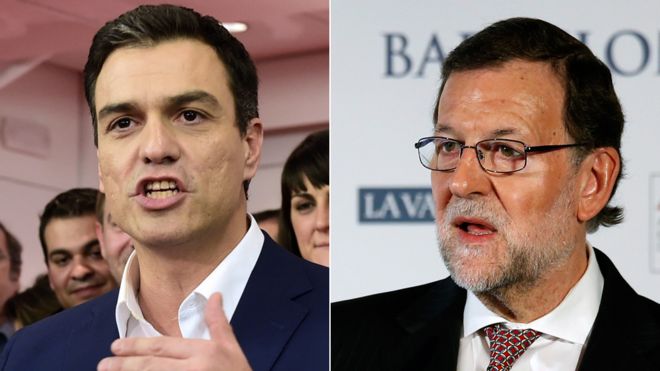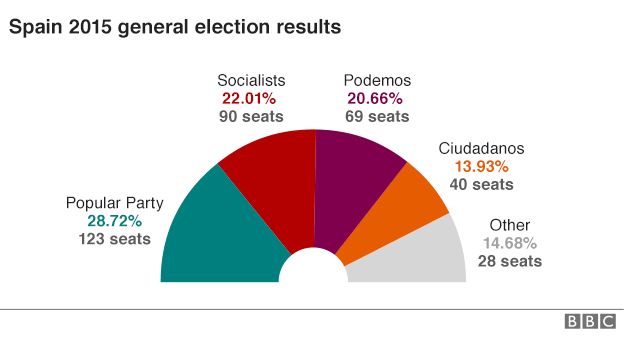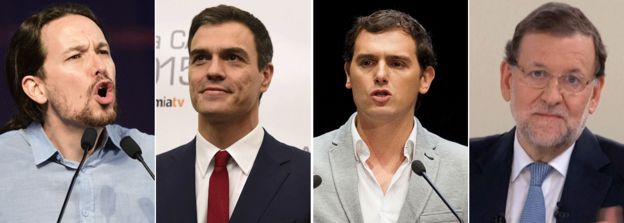Spain rivals weigh coalition options in post-election talks
- 1 hour ago
- Europe
 AFP/Reuters
AFP/Reuters
Spanish Prime Minister Mariano Rajoy is meeting Socialist leader Pedro Sanchez for exploratory talks on forming a coalition government.
The new liberal Ciudadanos (Citizens) party, which came fourth in Sunday's election, now wants a "pact" with them.
Ciudadanos leader Albert Rivera said they would exclude left-wing Podemos, "which wants to break Spain up".
Podemos, unlike the others, backs the Catalan nationalists' call for a referendum on independence from Spain.
Spain is braced for weeks of tough negotiations, after the election left the country's politics fragmented, with the two new parties - Ciudadanos and Podemos (meaning "we can") - making a big impact.
Mr Rajoy's conservative Popular Party (PP) got 123 seats - far short of the 176 minimum needed to govern alone.
For decades the Socialists (PSOE) and PP alternated in government.
The Rajoy-Sanchez talks got under way at government headquarters, Madrid's Moncloa Palace.
The PSOE got 90 seats - its worst result in recent history - while Podemos got 69 and Ciudadanos 40.

The PSOE is against Mr Rajoy leading Spain's next government. The PP's result was its worst since 1989.
Mr Rajoy insists that any coalition partner must work for the unity of Spain. He is firmly opposed to any Catalan referendum on independence.
Influential deputy
Mr Rajoy's deputy, 44-year-old Soraya Saenz de Santamaria, has emerged as a powerful figure, and appeared on the PP's campaign posters.
She took part in the first two election debates on TV, after Mr Rajoy decided not to take part. Some see her as a potential replacement for him as PP leader.
The PP's vote took a battering because of a party funding scandal and widespread anger over economic austerity. Spain's 21% unemployment rate remains one of the highest in Europe, and inequality grew after the financial crisis.
The election result was seen as a rejection of traditional Spanish politics, dominated by the PP and PSOE since the nationalist dictator Francisco Franco died in 1975.
There is speculation that a left-wing coalition government could be formed - along the lines of neighbouring Portugal. But there are serious divisions between the PSOE and Podemos - and together they would still be short of a majority. They might have to woo small leftist parties in the Basque Country and Catalonia.
 Getty Images
Getty ImagesDoing the post-election sums:
- Grand coalition: Spain has never had a so-called grand coalition that would bring the Popular Party and the Socialists together - and the Socialists said on Monday they would not join a grand coalition
- Grand coalition pact: Ciudadanos (Citizens) leader Albert Rivera wants the PP and Socialists to join with his party to prevent Catalonia moving to independence
- Coalition of losers: The Socialists could link up with Podemos and Ciudadanos in a move that would echo the outcome of elections in Portugal last month
- Regional solution: The Socialists could also strike a deal with Podemos and smaller regional parties that won just a few seats each, thereby removing the need for a deal with Ciudadanos
No comments:
Post a Comment